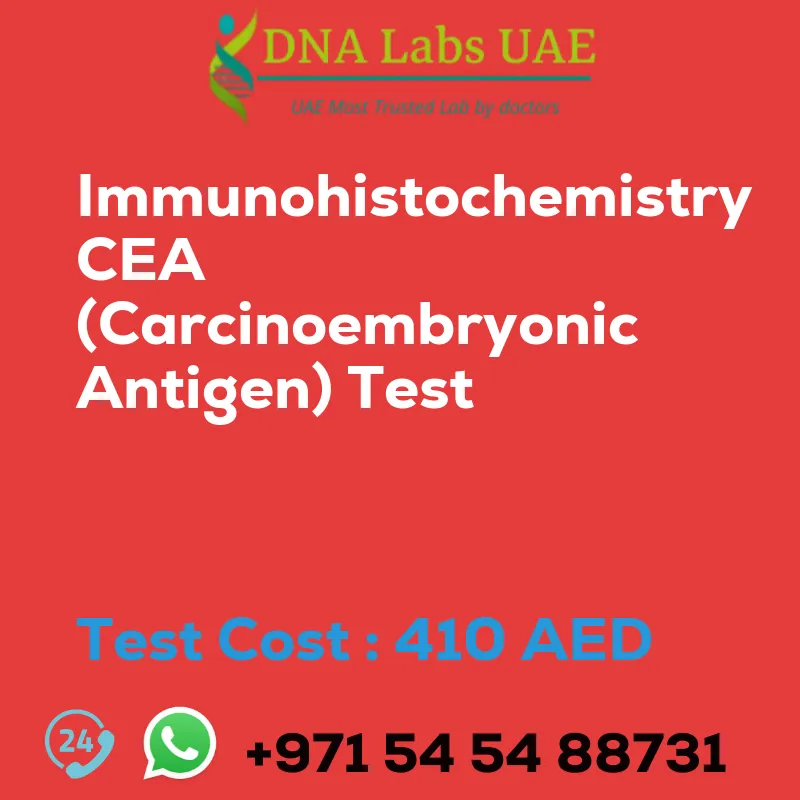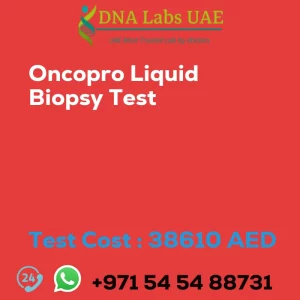Immunohistochemistry CEA (Carcinoembryonic Antigen) Test Price 410 AED in Dubai
Understanding Immunohistochemistry and CEA
Immunohistochemistry (IHC) is a laboratory technique used to detect specific proteins or antigens in tissue samples. It plays a crucial role in diagnosing various diseases, including cancer. The Carcinoembryonic Antigen (CEA) is a protein typically found in embryonic endodermal epithelium but is also present in certain types of cancer, such as colorectal, lung, breast, and pancreatic cancers. The Immunohistochemistry CEA test is designed to identify the presence of CEA in tissue samples, aiding in the diagnosis and monitoring of these cancers.
Importance of the CEA Test in Cancer Diagnosis
The CEA test is particularly important in the diagnosis of colorectal cancer, where it is used as a tumor marker. Elevated levels of CEA in the blood or its presence in tissue samples can indicate the presence of cancer. However, it is essential to note that not all cancers produce CEA, and not all elevated CEA levels are due to cancer. Therefore, the CEA test is often used in conjunction with other diagnostic tools to ensure accurate diagnosis.
How the Immunohistochemistry CEA Test Works
The Immunohistochemistry CEA test involves several steps:
- Sample Collection: A tissue sample is collected from the patient through biopsy or surgery.
- Sample Preparation: The tissue sample is processed and embedded in paraffin wax to preserve it.
- Antibody Application: A specific antibody that binds to CEA is applied to the tissue sample.
- Detection: A secondary antibody that recognizes the first antibody is applied, followed by a staining agent. This staining agent highlights the areas where CEA is present.
- Interpretation: A pathologist examines the stained tissue sample under a microscope to determine the presence and distribution of CEA.
Benefits of the Immunohistochemistry CEA Test
- Accurate Diagnosis: The test helps in accurately diagnosing cancers that produce CEA.
- Monitoring Treatment: It can be used to monitor the effectiveness of cancer treatment by tracking changes in CEA levels.
- Early Detection: In some cases, the test can aid in the early detection of cancer recurrence.
Expert Opinions and Current Trends
Experts in the field of oncology emphasize the importance of the Immunohistochemistry CEA test as a valuable tool in cancer diagnosis and management. Recent advancements in IHC techniques have improved the sensitivity and specificity of the CEA test, making it a more reliable diagnostic tool. Additionally, ongoing research is exploring the potential of combining the CEA test with other biomarkers to enhance its diagnostic accuracy.
Conclusion
The Immunohistochemistry CEA test is a critical diagnostic tool for identifying and managing cancers that produce the Carcinoembryonic Antigen. For residents in the UAE, understanding the importance and process of this test can provide valuable insights into cancer diagnosis and treatment options. By leveraging this test, healthcare providers can offer more accurate diagnoses and tailored treatment plans, ultimately improving patient outcomes.
Test Name:
IMMUNOHISTOCHEMISTRY CEA CARCINOEMBRYONIC ANTIGEN Test
Components:
CEA (Carcinoembryonic Antigen)
Price:
410.0 AED
Sample Condition:
Submit tumor tissue in 10% Formal-saline OR Formalin fixed paraffin embedded block. Ship at room temperature. Provide a copy of the Histopathology report, Site of biopsy and Clinical history.
Report Delivery:
Sample Daily by 6 pm; Report Block: 5 days, Tissue Biopsy: 5 days, Tissue large complex: 7 days
Method:
Immunohistochemistry
Test Type:
Cancer
Doctor:
Oncologist, Pathologist
Test Department:
DNA Labs UAE
Pre Test Information:
Provide a copy of the Histopathology report, Site of biopsy and Clinical history.
Test Details
Immunohistochemistry CEA (Carcinoembryonic Antigen) test is a diagnostic tool used to detect the presence of CEA in tissue samples. CEA is a glycoprotein that is normally produced during fetal development but is also found in small amounts in healthy adults. However, elevated levels of CEA can indicate the presence of certain cancers, particularly colorectal, pancreatic, and lung cancers.
The immunohistochemistry CEA test involves staining tissue samples with specific antibodies that bind to CEA. If CEA is present in the tissue, it will bind to the antibodies, allowing for visualization and detection. This test can be performed on various types of tissue samples, including biopsies and surgical specimens.
The immunohistochemistry CEA test is commonly used in the diagnosis and monitoring of colorectal cancer. It can help determine the extent of tumor spread, assess the effectiveness of treatment, and detect any recurrence of the cancer. Additionally, it can be used to differentiate between primary and metastatic tumors.
It is important to note that while the immunohistochemistry CEA test is a valuable tool, it is not specific to cancer and can also be elevated in other conditions such as inflammatory bowel disease, liver disease, and smoking. Therefore, it is usually used in conjunction with other diagnostic tests and clinical evaluation to make a definitive diagnosis.
| Test Name | IMMUNOHISTOCHEMISTRY CEA CARCINOEMBRYONIC ANTIGEN Test |
|---|---|
| Components | |
| Price | 410.0 AED |
| Sample Condition | Submit tumor tissue in 10% Formal-saline OR Formalin fixed paraffin embedded block. Ship at room temperature. Provide a copy of the Histopathology report, Site of biopsy and Clinical history. |
| Report Delivery | Sample Daily by 6 pm; Report Block: 5 days Tissue Biopsy: 5 days Tissue large complex : 7 days |
| Method | Immunohistochemistry |
| Test type | Cancer |
| Doctor | Oncologist, Pathologist |
| Test Department: | |
| Pre Test Information | Provide a copy of the Histopathology report, Site of biopsy and Clinical history. |
| Test Details | Immunohistochemistry CEA (Carcinoembryonic Antigen) test is a diagnostic tool used to detect the presence of CEA in tissue samples. CEA is a glycoprotein that is normally produced during fetal development but is also found in small amounts in healthy adults. However, elevated levels of CEA can indicate the presence of certain cancers, particularly colorectal, pancreatic, and lung cancers.
The immunohistochemistry CEA test involves staining tissue samples with specific antibodies that bind to CEA. If CEA is present in the tissue, it will bind to the antibodies, allowing for visualization and detection. This test can be performed on various types of tissue samples, including biopsies and surgical specimens. The immunohistochemistry CEA test is commonly used in the diagnosis and monitoring of colorectal cancer. It can help determine the extent of tumor spread, assess the effectiveness of treatment, and detect any recurrence of the cancer. Additionally, it can be used to differentiate between primary and metastatic tumors. It is important to note that while the immunohistochemistry CEA test is a valuable tool, it is not specific to cancer and can also be elevated in other conditions such as inflammatory bowel disease, liver disease, and smoking. Therefore, it is usually used in conjunction with other diagnostic tests and clinical evaluation to make a definitive diagnosis. |








